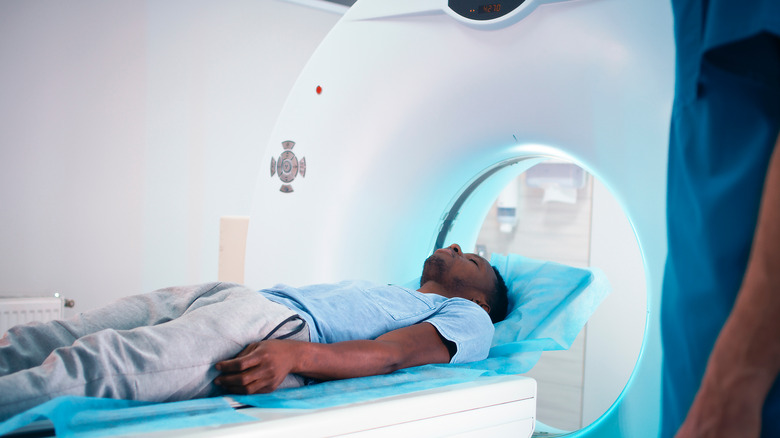Could CT Scans Cause Cancer?
Computed tomography (CT) scans are used to diagnose blood clots, fractures, tumors, heart disease, and suspicious growths. Doctors may also perform this test to monitor certain disorders or detect internal bleeding. CT scanners use a series of X-rays to make 3D pictures of your bones, organs, soft tissues, and blood vessels, explains the Cleveland Clinic. X-ray machines, on the other hand, produce 2D images and cannot detect soft tissue injuries, minor bone injuries, or inflamed tissues, notes Johns Hopkins Medicine.
While both CT scans and X-rays use ionizing radiation, the former requires significantly higher doses and carries more risk for patients. A lumbar spine X-ray, for example, emits about 1.4 millisieverts (mSv), comparable to the levels of natural radiation to which most people would be exposed over a period of six months, reports the Radiological Society of North America. A CT scan of the abdomen and pelvis, by comparison, emits 7.7 to 15.4 mSv, comparable to 2.6 to 5.1 years of natural background radiation. A spinal CT scan produces approximately 8.8 mSv, whereas a chest CT scan emits 6.1 mSv, equivalent to three and two years of natural background radiation, respectively.
Background radiation comes from the sun, rocks, soil, and other natural sources, and its levels vary depending on where you live. The average American is exposed to about 3 mSv of naturally occurring radiation per year, says the Radiological Society of North America. CT scans use larger doses of radiation, which can have long-term health effects.
No amount of radiation is perfectly safe
More than 80 million CT scans are performed each year in the U.S. alone — and about 30% of them are not medically necessary, reports the Washington Post. For example, some doctors would order this test to determine the cause of migraines instead of conducting a neurological exam. Some patients are also told to get CT scans for sinus infections or stomach pain.
Computer tomography is overused, unnecessarily exposing patients to radiation, warns Kaiser Health News (KHN). Estimates indicate that about 2% of future cancers, or 29,000 cases per year, could be attributed to radiation from CT scans. A cohort study conducted on nearly 31,500 people found that one-third of patients got at least five CT scans during their lifetime, and 5% had 22 to 132 examinations. These recurrent exposures were estimated to cause 1% of cancer deaths in the study, notes the journal Radiology.
Radiation from CT scans may soon be responsible for over 15,000 cancer deaths annually, says KHN. A single CT scan increases cancer risk by 0.05%, according to some older studies, but currently, there isn't enough data to measure the risks involved, says Scientific American. "The safest thing is to assume that no amount of radiation is safe. And if we find out in 20 years that a little bit was not harmful, then what did we lose by trying to minimize the dose?" said Donald Frush, a Professor of Radiology at Duke University School of Medicine.
Should you get a CT scan or consider other options?
CT scans can save lives, and the National Cancer Institute warns that in some cases, not getting the test can be riskier than getting it. However, you should consider alternatives before getting the test.
CT scans account for nearly 25% of the radiation Americans are exposed to, reports Harvard Medical School. As the researchers note, ionizing radiation can cause DNA mutations and cancer in the long run. Furthermore, the radiation from CT examinations is cumulative. Harvard Medical School points out that in one study, the risk of cancer increased by up to 12% among patients who had many CT scans.
KHN reports that CT scans may be profitable for hospitals, which may encourage casual use of the tests. On top of that, you may get imperfect results even if you're in good health, so your doctor might order additional tests that may not be necessary.
"No one says that you should avoid a CT scan or other imaging test if you really need it, and the risk posed by any single scan is very small," explains Dr. Marvin M. Lipman, the chief medical adviser at Consumer Reports. "But the effect of radiation is cumulative, and the more you're exposed, the greater your cancer risk. So it's essential that you always ask your doctors why they are ordering an imaging test and whether your problem could be managed without it." For example, there are cases where an MRI or ultrasound could replace a CT scan.



